|
|
Founded in 2004 by legendary conservationist Richard Leakey, WildlifeDirect is an innovative member of the conservation community. WildlifeDirect is really a meta-organization: it gathers together hundreds of conservation initiatives who blog regularly about the trials and joys of practicing on-the-ground conservation. From stories of gorillas reintroduced in the wild to tracking elephants in the Okavango Delta to saving sea turtles in Sumatra, WildlifeDirect provides the unique experience of actually hearing directly from scientists and conservationists worldwide.
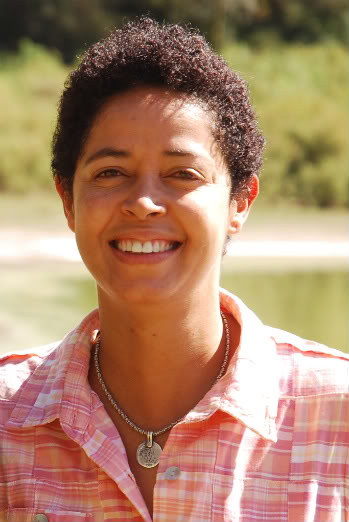 Paula Kahumbu, Executive Director of WildlifeDirect. |
“Anyone can interact, participate, and donate from anywhere in the world,” Paula Kahumbu, WildlifeDirect Executive Director, explained to Monagaby.com in an August 2009 interview. “By networking people at the conservation frontline with others all over the world, we have created what we call a virtual endowment. It is a vast community of people ready to respond when called upon in a time of need or during a crisis to help solve wildlife conservation challenges.”
The program has been a success, providing small, but vital, conservation initiatives with much needed funds and attention.
“To date we have over 100 bloggers and over 70,000 unique visitors per month. Last year this community donated to over 70 projects raising nearly $500,000 which went directly to the field,” says Kahumbu. Although stationed in Kenya, and with a general focus on Africa, WildlifeDirect also has bloggers in Asia and South America.
But as all conservationists—and environmentalists know—the path is never easy. Late 2008 brought new and sudden difficulties as the global economic crisis rippled through WildlifeDirect and many of its partners.
“Times are very tough for conservation organizations anywhere. Many major donors are scaling back to protect their cores, which means letting go of small projects. Many of them will I fear, will go bust…Even small donors have scaled back. Conservation groups are making tough decisions, but many are sticking it out and weathering the storm by working hard even for nothing,” Kahumbu says, adding that WildlifeDirect itself has suffered under the crisis, stalling developments and leaving the organization wondering, at times, about its future.
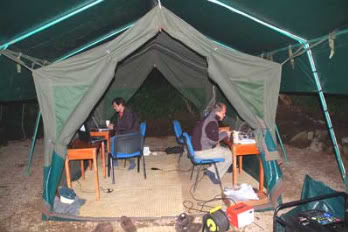 WildlifeDirect’s first field office in Congo – blogging was done from a tent inside Virunga National Park. Photo Courtesy of WildlifeDirect. |
For wildlife, Kahumbu argues the crisis has been “a disaster”.
“There is far less money for conservation in general. This means there is less monitoring so we will not even notice when some species go extinct. Fewer people care about species anymore, governments are not investing in conservation,” she says, yet adds that any crisis may bring new opportunities. “I’m hoping that the crisis will force us to be more strategic in how we spend limited resources on conservation and instead of pouring vast amounts on single species, we can start looking afresh at priorities. For example making decisions based on cost-benefit analysis of saving entire ecosystems, and creating eco friendly livelihoods for communities in wildlife rich areas.”
Kahumbu says that large-scale changes need to happen in order for the world to start tackling the environmental crisis, including mass extinction and climate change.
“I think that to engage the world we will need a paradigm shift in what we communicate. Today’s global headlines are monopolized by scandals, Enron, Financial crisis, Iraq, the British MP’s allowances, Swine flu, Kenyan elections, Wii, Britney Spears baby…you name it. We are inundated with unimportant information every single day [… ] I think we need to be snapped out of our stupor to realize what’s really happening. We need to take action. We must change those headlines. I think we could create a global culture of caring for the planet by having headlines on the health of Planet Earth everyday. We should be making these issues important, and we should be frowning deeply on those who destroy, emit and waste. We could drive a new social agenda that is informed about and cares about things that matter: our future, and our planet. Perhaps then everyone will be able to believe in a future that is fair for all, clean and healthy, rich in biodiversity and able to sustain us into perpetuity.”
Mongabay.com spoke to Paula Kahumbu in August 2009 about conservation, climate change, and the economic crisis.
Introducing WildlifeDirect
Mongabay: What is your background? How did you end up as Executive Director of the new and innovative conservation organization, Wildlife Direct?
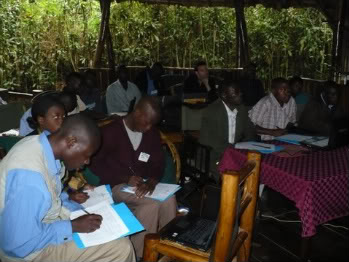 WildlifeDirect training current conservationists, future bloggers. Photo Courtesy of WildlifeDirect. |
Paula Kahumbu: Like most Kenyans of my generation, I grew up surrounded by wildlife, birds, snakes and mammals. I spent my childhood exploring swamps and forests and in those days it was safe and clean. I was inspired by this to dedicate my life to saving the wilderness and wild species. I started off with a deep interest in primates and worked in a remote protected areas with two endangered primates. For my PhD I studied elephants to understand how they manage forests. I fell in love with them and ended up getting deeply involved in the ivory crisis in 1989 and 2000. Offering advice to KWS (Kenyan Wildlife Service) Director Richard Leakey about the issues arising in the ivory debate landed me in a job at the government agency. I loved the wilderness and field work but I hated the people politics. Over the years I’ve witnessed how our wilderness and wild species are going fast due to political, social and economic short sightedness. I was about to emigrate to South Africa and go back to teaching in a university when Richard Leakey stopped me, told me off for giving up on Kenya, and invited me to join WildlifeDirect, the organization he founded and believes strongly in. I’ve been here ever since.
Mongabay: Wildlife Direct is unique in terms of conservation organizations—what is your approach?
Paula Kahumbu: It’s simple, rangers and conservationists write blogs on wildlifedirect.org about their daily lives at the conservation front line. Anyone can interact, participate, and donate from anywhere in the world. By networking people at the conservation frontline with others all over the world, we have created what we call a virtual endowment. It is a vast community of people ready to respond when called upon in a time of need or during a crisis to help solve wildlife conservation challenges. To us, a million small donations are much more valuable than one big donation, so we aim for micro donations from a large network of friends. We believe that virtually anyone anywhere can give a little to something they care about, and people give to us because we provide real time transparency and accountability through blogs so that donors can see their money at work. Donors can also donate time to help bloggers with networking, uploading photos, doing research, or even visiting the project. The size and responsiveness of our online community is how we measure our success. To date we have over 100 bloggers and over 70,000 unique visitors per month. Last year this community donated to over 70 projects raising nearly $500,000 which went directly to the field.
Mongabay: What challenges has the organization faced since its creation in 2004?
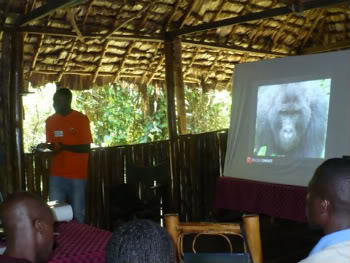 WildlifeDirect training bloggers. Photo Courtesy of WildlifeDirect. |
Paula Kahumbu: Three things. First challenge was technological, how do we develop and support a technology solution that aims to a global audience, but is built in Africa? The original concept was built in Italy, it looked great but mending glitches was difficult due to the language barrier. We are now using developers in Kenya. Secondly finding funding for our core costs has always been tough; traditional donors want to give money to field projects not to organizations like ours. We don’t charge a fee to our bloggers so we need to finance our core costs support, development and hosting from other sources. This year we won a MacArthur grant without which we might have collapsed. We’re not out of the woods yet but we’re clinging on and our partners are grateful, this is an extremely difficult time for fund raising for conservation so they are really busy telling their stories. Finally, many organizations we have spoken to and tried to bring on board have simply copied the concept. They don’t see the value of keeping the online community together and this is a bit disappointing.
Mongabay: I have to ask, Richard Leakey is a conservation legend both in Africa and across the world. What’s it like to work with a man who has given so much into saving Africa’s wildlife?
Paula Kahumbu: Working for Leakey is always inspiring. He is passionate and super-smart. He expects a lot which can be challenging, and yet exhilarating knowing that he believes in us. He has the memory of an elephant which is useful when we need help and have hit a brick wall – there is usually someone that he knows can help us. He’s also extremely compassionate and indeed rather fatherly. Although running the Turkana Basin Institute is his main job, he often wanders around our open plan office, visiting our desks, chatting to us and introduces us to any important visitors. It doesn’t really feel like we’re working for one of the most famous people on this planet; he’s very down to earth and human. It’s great working for him; I love it.
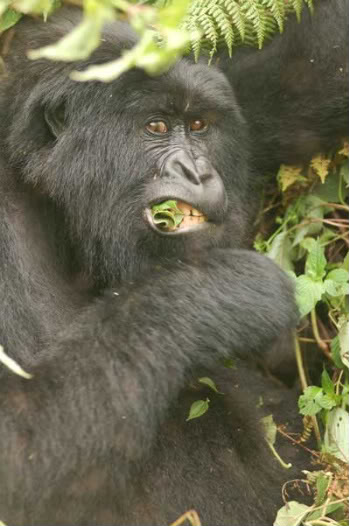 Many of WildlifeDirect’s participating organizations work directly with the world’s great apes, including mountain gorillas. Photo Courtesy of WildlifeDirect. |
Mongabay: Wildlife Direct currently carries 80 blogs from Africa, Asia, and South America, are there plans to add more? Any plans to extend geographically beyond those three continents?
Paula Kahumbu: We are always expanding and we receive about 4 applications for new blogs per week. If they meet our criteria we do accept them. Our goal is to be global but our focus is to help those organizations in developing countries that need the support most.
Economic Crisis and Conservation
Mongabay: You work with a lot of very small, but extremely effective and important, conservation groups every day—how has the global economic crisis affected them and their work?
Paula Kahumbu: Times are very tough for conservation organizations anywhere. Many major donors are scaling back to protect their cores, which means letting go of small projects. Many of them will I fear, will go bust. We thought that WildlifeDirect’s model was perfectly suited for a recession environment, after all, who can’t afford to give 10 dollars during good times or bad? Well, even small donors have scaled back. Conservation groups are making tough decisions, but many are sticking it out and weathering the storm by working hard even for nothing. We have noticed a surge in interest by organizations to join WildlifeDirect, some of them large organizations that have lost major donors.
Mongabay: Has the economic crisis affected Wildlife Direct itself—if so, how?
Paula Kahumbu: The economic crisis couldn’t have come at a worse time. A potential major donor pulled out at the last moment last year jut as we were about to implement our strategic plan. That was devastating. We had to scale back and take our developments much more slowly. We have been badly hit because our core funds are raised through grants and many large donors are scaling back. We still have a $100,000 hole in our operational budget for this year so we’re looking for donors, partners, or supporters who believe in what we are doing and will be willing to help us over this hump.
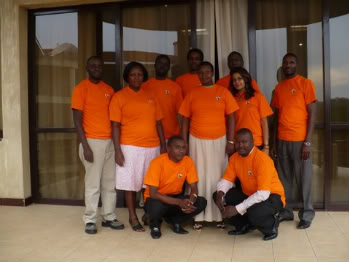 Group of bloggers. Photo Courtesy of WildlifeDirect. |
Mongabay: Some have argued that the economic crisis may actually have some positive environmental impact—i.e. lessening global consumption—what is your view?
Paula Kahumbu: Yes and No. Perhaps there will be less consumption in the West. In developing nations where the recession means that more people are on the brink of starvation, the opposite happens. Desperate people can’t afford to make long term decisions. In Kenya for example we have seen an explosion of bushmeat hunting – why? Because people are hungry. In some places the wildlife is almost completely gone, and they are now eating baboons. It is tragic that governments found the means to bail out those responsible for this economic crisis but have been unable to find the resources to save our environments, to alleviate poverty and to protect our wildlife heritage. It makes me mad that we have such backward global priorities.
I can only think of one place where the global crisis has been good, the Democratic Republic of Congo. Before the crisis high global prices for their minerals was leading to the destruction of the forests in the east, and the illegal mining that was financing the militias that were destroying the parks. The collapse of commodity prices last year led to the collapse of these militias, and now Rwanda and Congo are cooperating. This means that the parks can now be managed effectively, and some donors are taking advantage of this opportunity. So, yes, in this case, there’s at least one conservation area that we can thank the greedy bankers for.
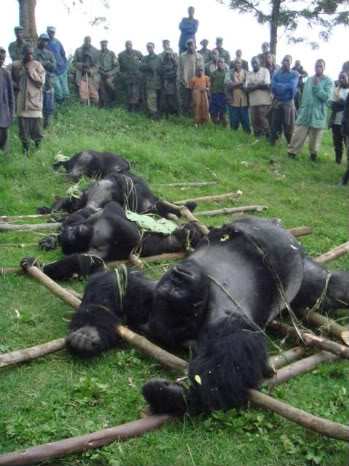 Infamous massacre of gorillas in Virunga National Paark. Photo Courtesy of WildlifeDirect. |
Mongabay: Is it possible to balance economic development in poorer nations without plundering, and thereby devastating, the environment for goods?
Paula Kahumbu: Of course it is possible to develop without destroying but it takes good thoughtful leadership, excellent planning and enforcement of plans. Theses things are in short supply in Africa. What we have in Africa, and many other places, is a greed that seems limitless, and sadly is the consequence of aping the West. The West is addicted to consuming, and developing nations think that they will get rich by supplying the consumers. Our political systems aggravate this because it drives short term and mind-bogglingly short-sighted ventures. Few countries have national targets that that the public know about and can measure the performance of their elected officials against.
Mongabay: What do you think the economic crisis has meant for endangered species worldwide?
Paula Kahumbu: It’s a disaster. There is far less money for conservation in general. This means there is less monitoring so we will not even notice when some species go extinct. Fewer people care about species anymore, governments are not investing in conservation. But yet they seem to have funds to address climate change adaptation, it seems more immediate. But, I’m hoping that the crisis will force us to be more strategic in how we spend limited resources on conservation and instead of pouring vast amounts on single species, we can start looking afresh at priorities. For example making decisions based on cost-benefit analysis of saving entire ecosystems, and creating eco friendly livelihoods for communities in wildlife rich areas.
The Effect of Climate Change on Africa’s Wildlife
Mongabay: For wildlife climate change is seen as an unpredictable threat, since no one really knows how well already-imperiled species will be able to adapt to a warmer globe. What is your view? Does climate change keep you up at night?
Paula Kahumbu: Yes, climate change does keep me awake at night. I climbed Mt. Kenya last year and could not believe how much the glaciers have shrunk. I’ve witnessed rivers drying up, and I’ve seen how our coral reefs are bleaching. I feel angry and deeply sad at the same time because it’s not our fault, and there is little we can do in poorer countries to have a smaller carbon footprint. I feel angry that communities in Africa that are doing so much to save forests are not rewarded – in fact we expect conservationists to accept and tolerate the costs to their own development, and we frown on anyone who cuts down a tree, or kills an animal for food. But we do reward those who exploit these resources, we give most of the carbon funding to big business. It’s insane! At present there is no incentive for land owners to return to environmentally friendly practices that will help us to survive in the climate changed world.
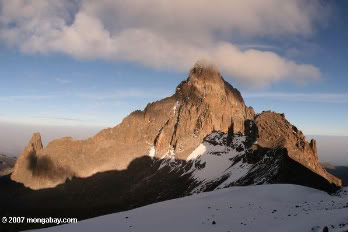 Mount Kenya. Photo by Rhett A. Butler. |
Mongabay: How do you see climate change particularly affecting ecosystems in Africa?
Paula Kahumbu: Most of Africa will be hotter and drier, streams will dry up, forests will not recover from degradation, fisheries will disappear. We will see extreme climate events will be more extreme and more common, like floods and droughts. More of our land will be ‘marginal’ and farming these landscapes will push ecosystems over a threshold and point of no return. Once we’ve lost soil and seeds no amount of rain will bring them back. The main impact we will notice will be deepening poverty which will be extreme and bushmeat hunting will exterminate wildlife from large tracts of land outside of the best protected areas. I expect we’ll see more incursions in the protected areas. Today our parks in Kenya are full of cattle due to a prolonged drought. Not only do the livestock compete with wildlife, introduce diseases and damage the environment, but they also put people in direct conflict with wildlife and predators will be exterminated, and antelopes killed by the herds by people who have to eat. I think we will see governments make more environmentally unfriendly decisions to address poverty and we will lose much of our wild lands.
Mongabay: Working with people across the globe, including in some of the world’s poorest countries, how do you think climate change should be tackled? Is it everyone’s problem or should the bulk of the responsibility be on developed nations?
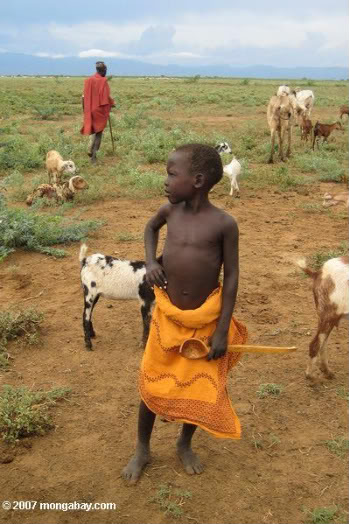 Boy from the Turkana tribe in Northern Kenya. Poor and marginalized peoples will be hit the hardest by climate change. Photo by Rhett A. Butler. |
Paula Kahumbu: I think climate change will be tackled badly! There’s a meeting of African environmental ministers taking place in Nairobi this week. I am amazed that the public are not aware, and have not had an opportunity to present views. The climate problem has been caused by the West but now India and China are amongst the largest polluters. We cannot ignore the fact that developing nations need to take responsibility, but how do you divert attention and funds away from the pressing crises like poverty and disease in Africa? They are far more immediate and, frankly, these issues influence voters so our policy makers will give lip service to climate change unless there is a short term benefit that can be translated into votes.
Regardless of who created the climate change problem, the world’s poor people will pay and they are paying already. We are kind of helpless and it’s shocking. Don’t you think it is amazing that the world’s most powerful nations are those that we consider to be the richest? They are the biggest producers and greatest contributors to the global economic and environmental crisis. The environmental debt outstrips their measurable wealth, doesn’t it? The countries richest in natural resources (forests, biodiversity, fish, clean water) have the smallest voice on the global platform because they haven’t converted these riches into gold bullion. Why don’t we measure the wealth of a nation realistically? I think that if intelligent aliens visited the earth today they would report back that we are a backward species that is destroying its own habitat even though we have the means to save planet Earth.
Mongabay: What are your ideas in engaging the public to supply adequate funding for large-scale environmental issues, such as climate change and the extinction crisis?
Paula Kahumbu: I think that to engage the world we will need a paradigm shift in what we communicate. Today’s global headlines are monopolized by scandals, Enron, Financial crisis, Iraq, the British MP’s allowances, Swine flu, Kenyan elections, Wii, Britney Spears baby…you name it. We are inundated with unimportant information every single day, we inhale and are addicted to irrelevant facts and, we have created a culture that cares more about gossip and other people than our own survival. These are all diversions that keep us busy and prevent us from seeing what’s really happening. I think we need to be snapped out of our stupor to realize what’s really happening. We need to take action. We must change those headlines. I think we could create a global culture of caring for the planet by having headlines on the health of Planet Earth everyday. We should be making these issues important, and we should be frowning deeply on those who destroy, emit and waste. We could drive a new social agenda that is informed about and cares about things that matter: our future, and our planet. Perhaps then everyone will be able to believe in a future that is fair for all, clean and healthy, rich in biodiversity and able to sustain us into perpetuity.
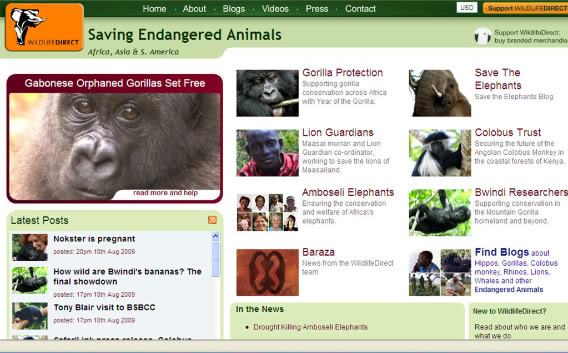
Screenshot of WildlifeDirect homepage, showcasing a variety of conservation blogs. Photo courtesty of WildlifeDirect.
Related articles
Environmental groups increasingly powerful, says researcher
(07/12/2009) With deforestation increasingly driven by industrial actors, rather than subsistence farmers, tropical timber managers should be aware of the growing clout of environmental groups in swaying public opinion, says a forest expert from the Smithsonian Tropical Research Institute, writing in the International Tropical Timber Organization’s July Tropical Forest Update.
New rainforest reserve in Congo benefits bonobos and locals

(05/25/2009) A partnership between local villages and conservation groups, headed up by the Bonobo Conservation Initiative (BCI), has led to the creation of a new 1,847 square mile (4,875 square kilometer) reserve in the Democratic Republic of Congo (DRC). The reserve will save some of the region’s last pristine forests: ensuring the survival of the embattled bonobo—the least-known of the world’s four great ape species—and protecting a wide variety of biodiversity from the Congo peacock to the dwarf crocodile. However, the Kokolopori Bonobo Reserve is worth attention for another reason: every step of its creation—from biological surveys to reserve management—has been run by the local Congolese NGO and villages of Kokolopori.
Prince Charles’ new online initiative for rainforests makes media splash
(05/06/2009) Releasing a video with as many species of celebrity as ants in the rainforest, while simultaneously turning to online sites such as MySpace and YouTube, appears to have worked for Prince Charles, a longtime advocate of rainforest conservation. His conservation organization’s new outreach to online users has garnered considerable coverage from the international media.
A “biocentric” perspective on environmental degradation
(11/10/2008) A new online magazine will take a “biocentric” perspective to the planet’s environmental problems. Ecological Internet, a pioneering environmental campaign group, published its first issue of New Earth Rising on Sunday. The issue includes original essays on climate change, water scarcity, over-consumption of Earth’s resources, and deforestation.